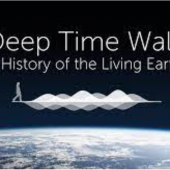
Abstract: At Schumacher College, Dartington, UK in 2008 we introduced the Deep Time Walk – a transformative learning experience in which college participants walk 4.6km in the countryside of the Dartington Estate representing the entire 4,600 million years of our planet’s history. The aim of the walk is to increase the ecological awareness of participants by giving them an embodied experience of the immense age of our Earth. At certain points during the walk a facilitator explains key events in earth history, such as the formation of the planet and the first appearance of living cells. Here we assess the effectiveness of the Deep Time Walk offered to eleven distinct groups of walkers during 2022 -2023. Participants on each of the eleven Deep Time Walks were asked to respond to a simple questionnaire asking them to quantify how much of seven qualities they felt immediately before and immediately after their walk (these were: Awe and Wonder, Sense of Earth’s Ancientness, Connection to Nature, Consequences of the Crisis, Hope, Commitment to Personal Change and Commitment to Political Change) . In total, 153 participants took part in the eleven walks and responded to the questionnaire. Analysis of the data showed a highly statistically significant increase across all seven qualities (p<0.00001 for each quality), suggesting that the Deep Time Walk is an effective means for developing and enhancing ecological awareness and commitment to action in these times of severe global crisis. Qualitative data were not collected during this phase of the study due to time limitations during walks. We recognise the importance of this kind of data and are devising ways of gathering it for both past and future walks.
Continue Reading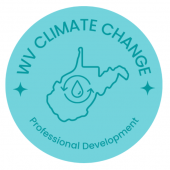
Abstract: The West Virginia Climate Change Professional Development (WVCCPD) Project was developed in 2019 as an effort to engage West Virginia K-12 teachers and informal educators in climate change professional development to encourage learning and action. Started by astronomy educators who are passionate about climate change, the project has been an experiment that has iteratively grown each year. By bringing in social science experts, communication specialists, community activists, master teachers, and learning how to best support teachers and their students through misconceptions and empowering action, we have engaged over 130 W.Va. educators. WVCCPD represents a promising case study for how educators can come together across disciplines and institutions to build an engaging climate change learning community, even in West Virginia, an area that is known for fossil fuel extraction. We hope this paper informs other teacher education practitioners.
Continue Reading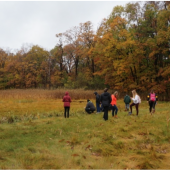
Abstract: I find it concerning, as a former elementary teacher and now a teacher educator, that not much attention is given to the preparation of new teachers on the environmental and social crisis of climate change. I have taught in two teacher preparation programs at public universities in the United States and understand the complexities, barriers, and limitations that these programs must contend with when trying to implement something new into an existing curriculum. In this paper I will describe my first attempt in navigating through the process of trying to include climate change education into a teacher preparation program. The focus of this initial effort was to understand the climate change literacy and self-efficacy towards teaching about climate change of the students in my elementary science teaching methods course.
Continue ReadingAbstract: In her narrative, Rioux argues for the significance of teaching place-based ecocomposition to diverse and multilingual writing students in order to emphasize and demonstrate the interconnectivity between all places and spaces that we inhabit despite human-made geographic boundaries. Addressing global issues with writers who represent various places around the globe enables writing students and instructors to hone in on the international nature of climate change while emphasizing the exigence that our natural context requires. Based on primary research, the author examines how teaching place-based ecocomposition to a uniquely diverse student group affects the writing students’ recognition of the interconnectivity of all places despite geographic location. Rioux explores how diverse environmental writing students perceive the effectiveness of a place-based course as it pertains to its objectives of helping students recognize their role within our extended environments, how to become more aware of the interconnectedness that combines and connects all places, and general environmental concerns that mark the Anthropocene. Providing pedagogical insights, Rioux also shares what the students find most effective in regards to course materials, design, and overall pedagogy, as it is imperative for our collective future to understand how to engage and motivate the next generation’s thinkers, writers, and Earth-dwellers.
Continue ReadingAbstract: Formal and nonformal educators help develop the environmental literacy (EL) of K-12 students, but do so in very different contexts. This paper describes educators’ views of their roles in developing student environmental literacy and barriers to that work. Educators with more advanced EL mentioned practices such as perspective taking and information evaluation. Many educators highlighted developing a connection – between students and the environment or between curriculum and students’ lives – as key to their work. The barriers identified reflect previous research, with nonformal educators also identifying access to student and peoples’ access to their sites as a major barrier.
Continue Reading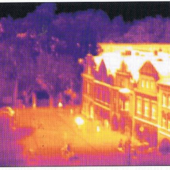
Abstract: A brief history of climatological science sets the stage for understanding the rise of the greenhouse gas thesis. That science is true as far as it goes, justifying our confidence, but it is an incomplete assessment of climatic systems. We have spent 40 years accepting the “pot lid” as the cause of the pot boiling over. That the “sun-warmed surface” impacts climate has been known for nearly 200 years. But greenhouse science failed to incorporate that and other scientific findings on urbanism, water cycles, and land management practices. To remedy this, I propose a broad climatic paradigm to address the actual cause of warming and provide a far more hopeful future with ample opportunities to resolve over-heating more completely, locally, and in a matter of months, years, or maybe decades, instead of centuries. Lastly, I discuss the significance of paradigm change, a new approach, and an expanded curriculum as challenges to sustainability education.
Continue Reading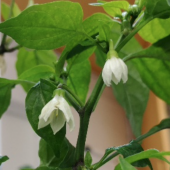
Abstract: To successfully implement the UN’s Sustainable Development Goals (SDGs), we must encourage all citizens to work together to enable a good life not only for us now but future generations too. In this article, we present an experiment carried out in autumn 2020 on a smart aeroponic garden. The goal of the experiment was to learn more about aeroponic cultivation and IoT technology and to acquire the know-how that would enable the participants to influence the environmental burden of food production. Our experiment showed that technology could also be used to introduce sustainable development themes to reach those target groups whose attention could not be attracted through other methods.
Continue ReadingAbstract: Many have written about the different ways people participate in authentic scientific research. However, some of the means used to engender public support in research may prove ultimately counterproductive. In this opinion piece we argue that science is not fun much of the time, and more importantly that fun in itself is not an end goal in engaging public audiences. To draw participation, we need to focus on motivation; which can include fun some of the time.
Continue ReadingAbstract: I was slow in coming to see the desperate need of sustainability education, in part because of a missed opportunity in my field of outdoor adventure education (OAE). Although a burgeoning set of scholars agree that OAE is strategically placed to educate for sustainability, little change within our discipline has occurred. To encourage the transition, this paper has four central aims. First, I contextualize the implications at stake by summarizing recent scientific predictions around climate change. Second, I differentiate sustainable OAE into the sustainability of OAE (e.g., its practices, footprint size, etc.) and OAE for sustainability (e.g., curricula that promotes education about sustainability), noting that despite long-standing petitions to address both, progress has been made in neither. Third, I celebrate, with others, the inherent potential that OAE has to promote sustainability through its educating in natural environs, within living/learning communities, which utilize physical/sensory, affective and intellectual ways of knowing that inspire critical impulses. Fourth, I outline the central changes that need to occur in order to create sustainable OAE. The foremost change needed is for OAE programs to curricularly commit to promoting a sustainability worldview, including values, knowledge, dispositions, and agency related to environmental, social, and economic justice. However, change of this depth will require a revision of OAE course offerings that allow for multiple and prolonged participant engagement over time. Such engagement, then, necessitates that OAE shift its emphasis from remote and sublime landscapes, to programs that not only connect participants to the places in which they reside, but cultivate a care and affection for them. This appreciation can be created through a combination of adventurous learning and microadventures. In sum, “local landscapes, far more often, as a way of life” encapsulate the changes OAE might make in contribution to the global need of sustainability.
Continue Reading
Abstract: Ecoliteracy can be defined as an understanding of natural systems and connections between biotic and abiotic factors within sustainable future. Green consumerism is an observable side of ecoliteracy. The aim of this study is, therefore, to examine the long-term effect of environmental education programmes intended for in-service teachers in terms of behavioural change. The teachers were joined ecopedagogy-based education programmes funded by TUBITAK (The Scientific and Technological Research Council of Turkey) in Turkey and were followed up after seven years. The methodology of the study was mixed method within a case study. Quantitative data were collected by a survey and analysed by R statistics. Qualitative data were analysed by content analysis. It was found that the green consumer behaviours of in-service teachers have improved in the long term. However, it is needed more follow up studies within different time frames and country comparison studies in the future.
Continue Reading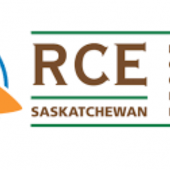
Abstract: Three decades ago Julius Nyerere (1990) wrote Challenge to the South. In response to the legacy of colonialism, Nyerere challenged the nations of the Global South to advance their development and to free their people. These concerns are as relevant today as they were in the 1990s. Established for the United Nations Decade of Education Sustainable Development in 2005, there are now over 175 Regional Centres of Expertise (RCEs) on Education for sustainable Development (ESD). This paper offers a case study of RCEs worldwide with a particular focus on challenges, and responses, including a focus on the select Sustainable Development Goals (SDGs) of poverty and health. Further, an account is given of RCEs which have attended to the recognition of Indigenous and traditional ways of knowing.
Continue ReadingLink to the Ecomedia Literacy Table of Contents Lopez et al. Editorial Overview JSE April 2020 Ecomedia Literacy PDF Forward from JSE Editor-in-Chief, Clare Hintz: The Journal of Sustainability Education marks its tenth anniversary year with an issue on Water Literacy (published in March) and this issue, Ecomedia Literacy. From a dream of several Ph.D. […]
Continue ReadingAbstract: The field of media education, emerging within the instrumental vision of modernity, has largely ignored its unspoken modernist assumptions. In this article, we argue the time has come to fully engage an embodied view of media from an evolutionary, ecological perspective—what we might call ecological modernism. This is a perspective that views media as evolving mediations through various material/technical practices, where body knowledge, rather than some idea of objective reality, is understood as the empirical ground for how we come to make sense of ourselves and the world. The focus is then shifted from the problem of subject versus object relationships to how subjects and objects are mutually constitutive. By extension, the juxtaposition of the concept of citizen with the body clarifies yet another crucial dimension of the embodied perspective. Two examples of “citizen”-based media education projects are briefly reviewed from this ecological modernist perspective in order to consider the implications of resituating grounded citizen-oriented media education.
Continue ReadingMovies as Mirrors is a conversation podcast in which guests discuss films that reflect a social issue that interests or affects them. On this episode, Professor of Humanities George Handley discusses the 2011 film “The Tree of Life” with podcast creator Benjamin Thevenin and guest-host Camlyn Giddins. The conversation explores the film’s representations of our relationship with the natural world, and in particular its use of eco-theology to introduce its audiences to ecological issues. We discuss the value of film as environmental education for the public and the need for more nuanced cinematic representations of issues like climate change.
Continue Reading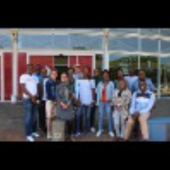
Abstract: Reporting to the public on climate change impacts, adaptation, and mitigation requires journalists to be equipped to engage with a wide range of technical content in order to communicate it in an accessible and engaging way. Recognizing the need for journalists from a wide range of backgrounds, including those from community newspapers and radio stations in South Africa, to be able to undertake this task, the South African Department of Environment Affairs in partnership with GIZ commissioned the authors to develop and deliver a four-day climate change reporting training programme. This paper presents an overview of the structure and content of the course, and details the reflections after undertaking such an endeavor.
Based on the lessons learned, and an awareness that this kind of training may take place in the context where working community-level journalists may have a low knowledge base (of both the journalistic craft, as well as the content of climate science) the following recommendations emerge: scientific training may need to be combined with basic journalistic training (depending on the participants); learning-by-doing is central to journalists building their capacity in climate reporting training; and mother-tongue delivery of material is critical to the success of such technical training courses.
America is falling behind the rest of the world in science and math. There is therefore, a renewed emphasis on STEM subjects (Science, Technology, Engineering, and Math). But while mastery of STEM subjects is essential to the functioning of society, we’ve neglected some other areas that are at least as important, if not more so. But without an equal commitment to comprehensive civics education — an examination of subjects that touch on the relationships between people, government, the economy, and media — all the technical know-how in the world will be for naught. The author suggests a renewed focus on MESH education, which stands for Media Literacy, Ethics, Sociology, and History. Because if these are not given equal attention, we could end up with incredibly bright and technically proficient people who lack all capacity for democratic citizenship.
Continue Reading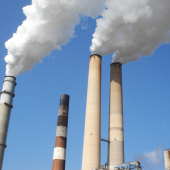
Abstract: The shift away from coal to renewable energy for electricity generation is producing environmental benefits during the climate crisis but also poses uncertainty for coal producers and others along the coal supply chain. Media representations of the coal debate shape how citizens understand and respond to it. This commentary exposes how audiences – even of pro-environmental media – reproduce dominant discourses promoted by fossil fuel corporations and reconceptualize those discourses into a Not in my Backyard (NIMBY) worldview. Critical discourse analysis helps to reveal how tensions between coal companies and renewable energy proponents are exacerbated by controlled coal messaging. Coal propaganda evokes images of a noble and reasonable energy source and places coal within a positive framework that enhances local knowledge, protection, and economic security. Conclusions point to the importance of media literacy instruction as a means for consumers to gain critical distancing strategies and broader perspectives about the climate crisis.
Continue ReadingAbstract: In recent years, media scholars and educators have made an effort to address ecological issues in their work. Ecomedia literacy adapts the principles and practices of the media literacy movement in order to prepare the public to critically engage with the relationship between media and the environment. However, this article argues that the philosophical frameworks, on which existing approaches to media literacy education are founded, are limited. The field’s reliance on traditions of constructivism and cultural studies allows learners to engage with ideas, but not things. The article argues that an ecomedia literacy that draws from speculative realism—in particular, in recognizing the reality of non-human things, emphasizing materiality, and challenging the nature/culture divide—will more effectively prepare the public to critically engage and practically respond to pressing ecological issues such as climate change.
Continue ReadingAbstract: This paper examines the ecologically oriented speculative fiction genre known as “solarpunk” and its value for the cause of environmental justice. This article argues that the status quo is characterized by relative inaction on the issue of fighting climate change and that this inaction is the result of an inability to imagine a “green” future. As a form of speculative fiction which explicitly depicts such green futures, solarpunk may be a valuable tool in promoting action by overcoming widespread cynicism about the future. Solarpunk fiction is thus a useful tool for sustainability educators because it encourages critical examination of one’s environmental impact. This article details the ways in which solarpunk stories function as counter-hegemonic media by intertwining issues of race, gender, sexuality, class, and colonialism with an ecological ethic.
Continue Reading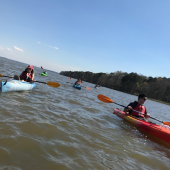
This essay describes a series of interdisciplinary projects addressing environmental issues in Florida where faculty and students from different departments collaborate on complex problems and produce multimedia work aimed at reaching a public audience. Through a series of brief case studies, a model of interdisciplinary experiential education emerges, providing a pathway forward for other faculty to create community engaged projects that have real world impacts.
Continue Reading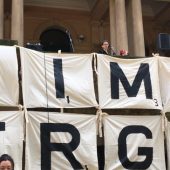
Transformative sustainable pedagogy and public intellectual work share the same aims and guideposts, including upholding higher education’s foundational intentions of fostering moral character in tomorrow’s leaders. Radical modes of sustainable education, including regenerative pedagogy, which tends to the global shift to restore, respect, and regenerate ecological and societal balance, and inside-out pedagogy, which helps learners take their inner seeds, sprouts, and blossoms of good ecocultural intentions to stages of external fruition, speak both to educating learners and engaging the public. If pedagogues aim to encourage students to put beliefs into action and be leading voices in ethically addressing today’s pressing environment and society problems, this may require role modeling by having the courage to do so themselves. In these contexts, the author relates her own experiences speaking for Extinction Rebellion as an illustration of expanding notions of what it means to be a sustainability educator today.
Continue ReadingThis editorial overview provides an introduction to this special Journal of Sustainability (JSE) issue devoted to water and climate change, which is being released during United Nations World Water Day 2020. The article contextualizes some of the water security risks that are exacerbated by climate change, such as increasing floods and droughts. This piece further provides a brief overview of the articles in the special water and climate issue of the JSE.
Continue Reading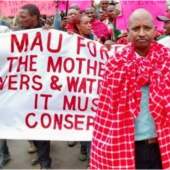
Abstract: This article posits that Maasai Indigenous activists’ call to save Kenya’s Mau Forest Water Tower for its ability to protect downstream water security has emerged as an environmental-policy microcosm illustrative of globally surging interest in such Nature-Based Solutions (NBS). Through an analysis of the Mau Forest issue, a series of United Nations Development Programme case studies, and increasing inclusion of NBS for water at recent global policy events such as the United Nations General Assembly and World Economic Forum, this article suggests that a new water infrastructure policy paradigm appears poised to increase implementation of NBS-informed by Indigenous and Traditional Ecological Knowledge (ITEK). The potential of this paradigm shift is illustrated by the North American Indigenous Mi’kmaq concept of Two-Eyed Seeing, which encourages the synthesis of solutions from both western-emanating Scientific Ecological Knowledge (SEK) and ITEK on a path toward positive social-ecological outcomes.
Continue Reading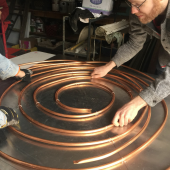
Abstract: Part Two of a two-article series describes water conservation through graywater use and rainwater harvesting. Sustainable methods of heating water for a recirculating shower, and potential methods for water filtration and purification are presented. Also addressed is the feasibility of sustainable showering alternatives. An opportunity for educators and students to collaborate in the development of an off-grid recirculating shower is provided as well.
Continue Reading
Abstract: Part One of a two-part article outlines a brief history of showering and questions current showering practices. Current global levels of water use and availability are discussed, plus water use in the United States, relative to Americans’ frequency of showering. The energy requirements for cities to provide clean water is outlined as well as the carbon dioxide emissions that are subsequently released during water delivery and wastewater disposal. In Part Two, water conservation through graywater use and rainwater harvesting is described, and sustainable methods of heating water are offered. Possible methods for water filtration and purification are presented. The feasibility of alternatives for a more sustainable shower is addressed. Both articles conclude with an invitation to students and instructors to collaborate with the author to construct a prototype of an off-grid recirculating shower.
Continue Reading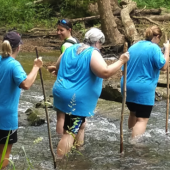
Abstract: The purpose of this article is to provide key aspects and learning outcomes associated with the Math of the Mountains Project. Math of the Mountains was a year long grant project that engaged 60 K12 mathematics teachers in the key concepts and applications of place-based learning and mathematics instruction. Through online coursework and peer support, a four-day immersive field experience, and teacher led field experiences, participants applied elements of PBL to create lesson activities that support real-world learning and problem solving scenarios.
Continue Reading
Abstract: Household composting is a practical sustainable behavior which should be further investigated. The Short Composting Survey was developed for use during the Compost Project pilot study to measure the knowledge, values, barriers, and social norms surrounding composting (n=25). The purpose of this research was to describe the testing and refining of the survey tool for the pilot study. Statistical analyses included calculating the Index of Item-Objective Congruence (IIOC) values and conducting a confirmatory factor analysis following administration of the survey. Nine respondents assisted with survey tool development by completing the IIOC, and values ranged from 0.29 to 0.66 which indicated that all of the survey questions matched more than one construct. The factor analysis resulted in a three-factor solution with a cumulative loading of 71.2%, meaning that these identified factors contributed 71.2% of the variance in responses. Factor 1 (“Values”) proved to be the strongest factor, explaining 36.6% of the variance, whereas Factor 2 (“Social Norms”) explained 20.04%, and Factor 3 (“Barriers”) had 14.6%. This survey may be useful for future food composting and sustainability-related research efforts.
Continue Reading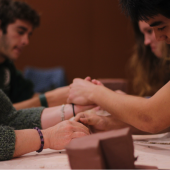
Abstract: This article describes an innovative, grant-funded symposium for creative social stewardship that sought to blend the triad of art, education, and the natural environment through a focus on socio-cultural sustainability and community engagement. The purpose of this article is to share foundational information related to the origins of the symposium, describe the tenants of community arts initiatives, feature a session snapshot, and discuss the value of creative social stewardship as a part of daily practice. We conclude by making recommendations for future endeavors in cultivating creative social stewardship conferences or initiatives, ultimately promoting the idea that collaborative, community-based and arts-focused events might inspire reflection on connection, nature, and creativity in ways that nurture sustainability.
Continue Reading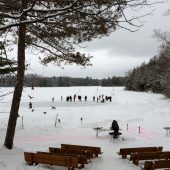
Abstract: In this article, we examine the collaborative efforts of university-employed folklorists with Waaswaaganing Anishinaabe (Lac du Flambeau Ojibwe) teachers and community leaders in what is currently known as northern Wisconsin. Focusing on the Ojibwe Winter Games—an annual weeklong event in February for middle school students that aims to revitalize traditional competitive games—we suggest that decolonizing sustainability education requires recognition that sustainability is pluralistic and culturally specific. Educators must facilitate a restorative systemic shift towards Indigenous sustainabilities through Indigenous-centered pedagogies and methods of knowledge production. In order to accomplish such a shift, our responsibility as academics and public folklorists must always be to the Indigenous communities with whom we work. We explore the role of non-Indigenous collaborators in Indigenous-led decolonization efforts, in developing educational systems that support and sustain Indigenous knowledge systems, and in the repatriation and rematriation of land, language, and culture.
Continue ReadingAbstract: Decolonization is a multifaceted and complex process, involving a wide range of concepts, including the restoration of Indigenous lands to Indigenous control, improved recognition of tribal sovereignty, strengthening of Indigenous worldviews and knowledge traditions, cultivating cultural responsiveness in education and health care, aligning research methods with Indigenous cultural priorities and values, and more.
This special issue of the Journal of Sustainability Education on the topic of Decolonization and Sustainability Education reflects many of these diverse projects. The issue is inclusive of Indigenous and allied voices, of academic and Indigenous discourses, of large-scale political actions and—what Jeff Corntassel calls—“everyday acts of resurgence.” The selections are arranged in ways that center Indigenous voices and the work on the ground that reinforces Indigenous sustainabilities and Indigenous-centered pedagogies.
Continue Reading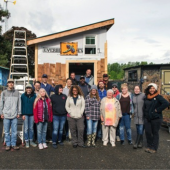
Abstract: Two tiny houses were constructed for the homeless at Dignity Village, Portland, Oregon, by Portland Community College students in two sustainability courses over 6 terms, using different approaches. By engaging the business community at large, various non-profits, parents of the students, and residents of the homeless village, the idea of community-based learning (CBL) was embraced by the instructor. CBL created an environment in which lack of experience and wide cultural variation were transformed into a cooperative community of inspiration.
Continue Reading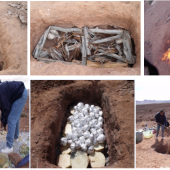
Abstract: For millennia, education for the Hualapai Tribal people was learned through intergenerational lessons taught with the family. This provided younger generations with the skills and knowledge needed to thrive in harsh desert environments. Over the past centuries tribal education has undergone numerous transitions. For the past twelve years the Hualapai Ethnobotany Youth Project has implemented an intergenerational learning program with the elders and youth of the tribal community to instill the centuries old knowledge that could only have been obtained through generations of experience. The program looks to new ways in modern times to teach the old ways in maintaining the continuity of knowledge that only the grandparents can remember.
Continue Reading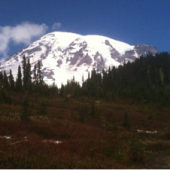
Abstract: In this article, we discuss the importance of Indigenous traditional ecological knowledge as the foundation of sustainability education, and we describe the need for, and successful efforts to, begin building an Indigenous Traditional Ecological Knowledge initiative at a research university. We share the guiding theoretical framework of our work, and the three goals of the initiative. We note the tensions involved in crafting a vision statement that a diverse group of faculty, staff, and students can all uphold in our collective work. We conclude with a description of our next planned steps for the initiative, and our hopes that this work will help decolonize sustainability education.
Continue Reading
The purpose of this policy study is to provide to educators and curriculum writers a critical account of the diversity and contestability of the conceptions of sustainability embedded into the policies and processes related to the transformation of K-12 curriculum in British Columbia (B.C.), Canada. First, we examine the different conceptions of sustainability within the context of distinctive socio-cultural paradigms: the industrial, the existentialist, and the symbio-synergetic. Second, we address the following key questions: in what socio-cultural paradigm is the dominant conception of sustainability grounded in new K-12 curriculum policy in B.C. and in which ways does that paradigm question the dominant industrial notion of modernity and development?
Continue Reading
Faced with everything from climate change to resource depletion, citizens must be environmentally literate. One path to literacy is through teacher education. Participants in this U.S.-based study completed a survey, indicating teaching methods and assessment strategies used to address the Guidelines for the Preparation and Professional Development of Environmental Educators themes. Although many indicated unfamiliarity with the Preparation Guidelines, the majority address them in their teaching. Fostering Learning, Environmental Literacy, and Planning and Implementing Environmental Education were commonly addressed, while Foundations of Environmental Education was not frequently addressed. Discussion, inquiry-based learning, and assigned readings were often used teaching methods, while lesson plans and reflections were common assessments. The results suggest that faculty members are implicitly including EE and that there are gaps in meeting the competencies in EE.
Continue Reading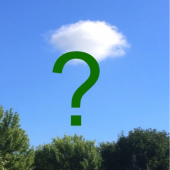
Increased understanding amongst scientists and the general public about anthropogenic impacts in general, and climate change in particular, behooves us as educators to adjust our courses and curricula. “Sustainability” and “green” topics are increasingly being discussed and incorporated, but this should be done with deliberation. We undertook this study to understand attitudes, perceptions, and habits of the student body at Iowa State University, with a focus on environmental knowledge and behaviors. Overall, we found that, regardless of demographic, students appear to be interested in environmental topics, reducing their footprint, and improving the environment overall. But, they did not necessarily want to pay more, nor did they fully embrace personal responsibility.
Continue Reading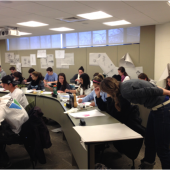
Engaging students not majoring in science, sustainability or environmental studies in learning environmental literacy and shifting their attitudes and behavior toward nature often requires a multi-perspective approach and presents unique challenges. We sought to: (1) pair artistic perspectives with botanical concepts to educate and interest our students in learning environmental literacy, (2) engage our students in careful observation and visualization of nature, and (3) increase the environmental sensitivity of our students by connecting botany with nature based art. To do this we designed a pre-class assignment, an in-class botanical art workshop, and a written reflection assignment that asked students to view, conceptualize, and create works of botanical art as a multi-perspectival process of engaging with relevant scientific processes and environmental concerns connected to botany. Here we provide a justification for the value of bridging science with art, detail our approach, describe student survey responses and thoughtful written reflections, and illustrate lessons learned and future plans.
Continue Reading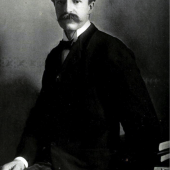
Some scholars of leadership for sustainability argue that more research needs to be done on the ‘who’ of leaders, the core drivers of the ‘what’ and ‘how’ of their decisions and actions. This paper looks at a leading US figure in sustainability, Gifford Pinchot, who led the establishment of the US Forest Service, and who devoted much of his career to conserving the natural world for the good of his fellow citizens. It describes the formation of the ‘who’ of Pinchot as an adult leader through a focus on his early learning environment in order to point to some essential and timeless principles for the education of leaders of sustainability.
Continue ReadingHuman beings today are living in times of unprecedented social and ecological crisis, a crisis that is to a significant degree of human making. The impending arrival of the Anthropocene geological epoch gives this crisis a name. As academics with a sense of responsibility for our relationships with planetary kin, the awareness of unfolding crisis calls on us to reach a deeper understanding of assumptions about the world, and of modes of living that these assumptions permit, which have been a human contribution to crisis. Furthermore, the Anthropocene calls us to act upon our new understanding. Taking modern European imperialism as a key generative force in the development of Anthropocene, we provocatively develop the idea in this article that the life-ways and worldviews of Indigenous Peoples colonized by European imperialism – including, potentially, marginalized and suppressed life-ways and worldviews of Indigenous Europeans – may hold critical insights by which to negotiate the Anthropocene and to challenge and change habits of thought and action that have led us to its threshold.
In doing so we outline the rationale behind the Alliance for Intergenerational Resilience (AIR) whose objective is to build social-ecological resilience by connecting and supporting locally based projects for the innovative and renovative co-evolution of social and ecological systems. AIR aims to generate inter-cultural relationships between Indigenous communities and communities no longer considered indigenous to place in order to support more meaningful, life-giving social and ecological relationships for all people. In order to further describe AIR’s objectives and its aspirations, the article draws on the Alliance’s inaugural event, the Elders’ Voices Summit, four days of Indigenous-led sustainability education with more than 100 international participants, representing community, university, government, philanthropy and not-for-profit sectors. We conclude by casting our hopes forward to envisage future re-indigenization work that supports the connection and reconnection of human beings with the Earth and the places of the Earth to which we belong.
Continue Reading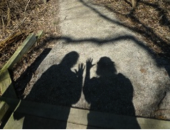
This article focuses on ‘Hope and a Hike’ a women’s walking group in Ann Arbor, Michigan. The group uses an online Meetup to bring women together for weekly one-hour hikes which include information about a local positive conservation initiative (the hope component). It combines exercise, health gains, and social opportunity, with knowledge, positive local conservation success stories and experience in forested areas. The goal is to awaken a connection to the natural environment with hope and a desire to care and take action for the environment. Participants are women, mostly ages 35-70. This case example includes how the group relates to research on: benefits of walking in nature, awe, women, hope, connection to nature, pro-environmental actions and relational activism. Details about hope topics and ideas for expanding the hikes could be used in informal education as well as in course development.
Continue Reading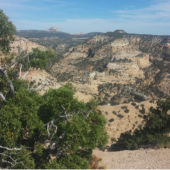
Climate change is a difficult subject to teach because it requires complex scientific understandings and is connected to personal beliefs (Spence, Poortinga & Pidgeon, 2012). It is important to teach students the science of climate change and impact their personal beliefs to produce behavior that will mitigate climate change. In this study pre and post surveys focusing on climate change understanding, belief, and behavior were administered. Interviews were also conducted. The quantitative and qualitative data were conflicting, but through triangulated data analysis learning design elements promoting Climate Change Literacy in higher education were identified. A conceptual model was developed with the learning design elements to improve the teaching of Climate Change Literacy. Findings depicted three design elements that increase students’ Climate Change Literacy: 1) Decreasing students’ psychological distance from climate change, 2) Utilizing students’ sense of place, and 3) Student investigation of their own research questions. Increasing students’ Climate Change Literacy is the critical first step in making sustainable societal transformations required for mitigating climate change, our most pressing environmental issue that impacts all people and the natural environment (Spence, Poortinga, & Pidgeon, 2012).
Continue Reading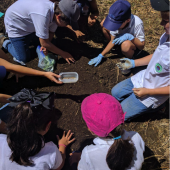
This article describes a sustainable agriculture workshop designed and led by Master’s students to support university-community engagement in Costa Rica. Our project had three transformative goals: 1) to empower Master’s students as educators, 2) to share food security knowledge with community youth, and 3) to strengthen our university-community relationships for knowledge dissemination. For other scholars who wish to apply principles from our Master’s student-led workshop within their local context, we describe our recommendations as well as areas for improvement regarding our three goals. Despite our workshop successes, it was a volunteer project that competed with the academic workloads of the students and the professor. We suggest that community engagement form part of regular academic obligations and courses to increase its accessibility and to provide more opportunities for Master’s students to transition into educators and practitioners before entering their fields of work.
Continue ReadingAbstract: Using a mixed methodology, we followed the preparation of fifteen teacher candidates through a summer content immersion and schoolyard ecology field experience as part of their alternative route to teacher certification program. The primary purpose of our summer project was to support and learn from the funds of knowledge of the teacher candidates and migrant youth. Next we sought to determine if a learner-centered teaching, modeled in a content immersion that explored the inner life of cells, could be applied heuristically to co-plan and teach schoolyard ecology. The results suggest that a learner-centered teaching translates well between content and field immersions and can positively support the cultural and community wealth of both candidates and migrant youth while affirming and deepening our appreciation of the local natural world.
Continue Reading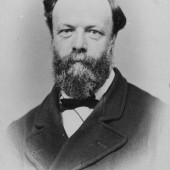
Abstract Innovation for sustainable environments is typically thought of as synonymous with the scientific and the future. This paper argues that historical stories about innovation to create sustainable communities in the past has a contribution to make to research and teaching in the field. It outlines the innovation of forestry in Australia in the nineteenth century, and the thought leadership of the prominent public servant who realized it. It argues that, together with science, students of sustainable environments need to learn to think holistically, framed first by an ethical vision of what a sustainable civil society looks like.
Continue Reading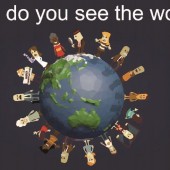
Abstract: Latest results in Education for Sustainable Development (ESD) research and practice show a tendency towards more holistic approaches aiming at deep transformation of the self and the meanings of human existence. Aligned with this, we present the Transdisciplinary Framework of Worldviews and Behaviours (TFWB) to describe the possible formation and expression of a worldview, a complex constellation of meaning and identity from which all human conduct emerges. Four key principles arising from the TFWB are: 1) The whole embodied nervous system is greater than the sum of its separated parts, especially when it comes to intelligence (information processing) and learning (meaning making); 2) The mind is a highly emotion-dependent and mostly unconscious entity; 3) A worldview is a unique arrangement of meaning each person builds, and lives through; and 4) Increasing self-awareness about how a personal worldview is formed and expressed generates increasing opportunities for that individual to explore and build a different meaning for their experience, or to explore and choose different forms to express it (behave). The TFWB informs a new perspective on learning that could be useful for the achievement of ESD’s transformative goals, guiding the innovative design of educational initiatives encouraging new conceptualizations about the meanings of being human; thus, facilitating potential behavioural transformations toward a more sustainable existence.
Continue ReadingAbstract: Sustainability has the potential to provide a holistic framework that can bridge the gap that is often found between socio-economic justice and environmental discourses. However, sustainability and sustainability education have typically accepted the prevailing socio-economic and cultural paradigm. It is my aim in this paper to demonstrate that a truly holistic and visionary sustainability (education) framework ought to demand radical and critical theories and solutions- based approaches to politicize and interrogate the premises, assumptions, and biases linked to the dominant notion of sustainability. If we are to envision and construe actual sustainable futures, we must first understand what brought us here, where the roots of the problems lie, and how the sustainability discourse and framework tackle—or fail to tackle—them. To do this is to politicize sustainability, to build a critical perspective of and about sustainability. It is an act of conscientização (or conscientization), to borrow Paulo Freire’s seminal term, of cultivating critical consciousness and conscience. In lieu of the standard articulation of politics as centralized state administration, ‘critical sustainability studies’ is based on a framing that gives prominence to a more organic, decentralized engagement of conscientious subjects in the creation of just, regenerative eco-social relations. It illuminates the ideological and material links between society, culture, and ecology by devoting particular attention to how knowledge and discourse around and across those realms are generated and articulated. I believe that future scholarship and activism in sustainability and sustainability- related fields would benefit immensely from dialoguing with this framework.
Continue Reading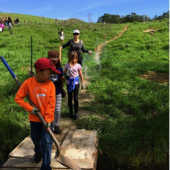
Future casting for us begins with going back — to the real basics, to understanding our place and the people who sustained themselves here for hundreds of years, engaging in real-world problem solving in pursuit of “the right kind of change at the right time.”
Continue Reading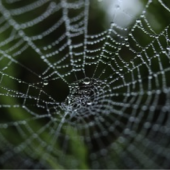
In our state of acute global crisis, we urgently need new leaders. In this short essay, I would like to sketch out my vision of such a new kind of leadership.
Continue Reading
Abstract: When examining energy consumption in human history, it is evident that society is entering a new era where the costs of energy generation from renewable sources are now competitive with fossil fuel generation. In light of this advance, this report examines recent milestones in the renewable energy sector, and projects what the near future might hold. In the years ahead, growth in the renewable industry will create increased demand for a trained workforce of scientists, engineers, and technicians with knowledge of renewable energy. Faculty development and educational programs will play a key role in preparing the next generation of renewable energy professionals. This report highlights the impact of one such initiative that was funded by the National Science Foundation. Educators are called to join the effort to create a sustainable future powered by renewable energy.
Continue Reading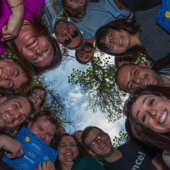
Abstract: In order to effectively address global sustainability challenges, a wide spectrum of society must be engaged. Universities generate knowledge, enhance understanding of sustainability problems and identify potential pathways to solutions. However, the information they produce often does not reach the public sector. Primary and secondary schools contain expert teachers and science communicators, but they are often limited by educational standards and other teaching duties. On the other hand, museums, such as science and natural history museums, are particularly skilled at translating scientific information so that it engages and excites the general public without the limiting expectations of school systems. Thus, partnerships between museums and universities offer great potential for disseminating sustainability knowledge and solutions on a global scale. However, given the complexity of sustainability problems, partnerships between universities and museums require a deep level of collaboration beyond the scope of information or resource exchange. In this article, we explore our experiences collaborating with museums, reflecting on challenges and, ultimately, identifying four main focal areas to successful, transformational collaborations. Though we focus on museum partnerships from the university perspective, we contend that any institution can apply these four steps to make progress on wicked problems that require immediate action.
Continue Reading